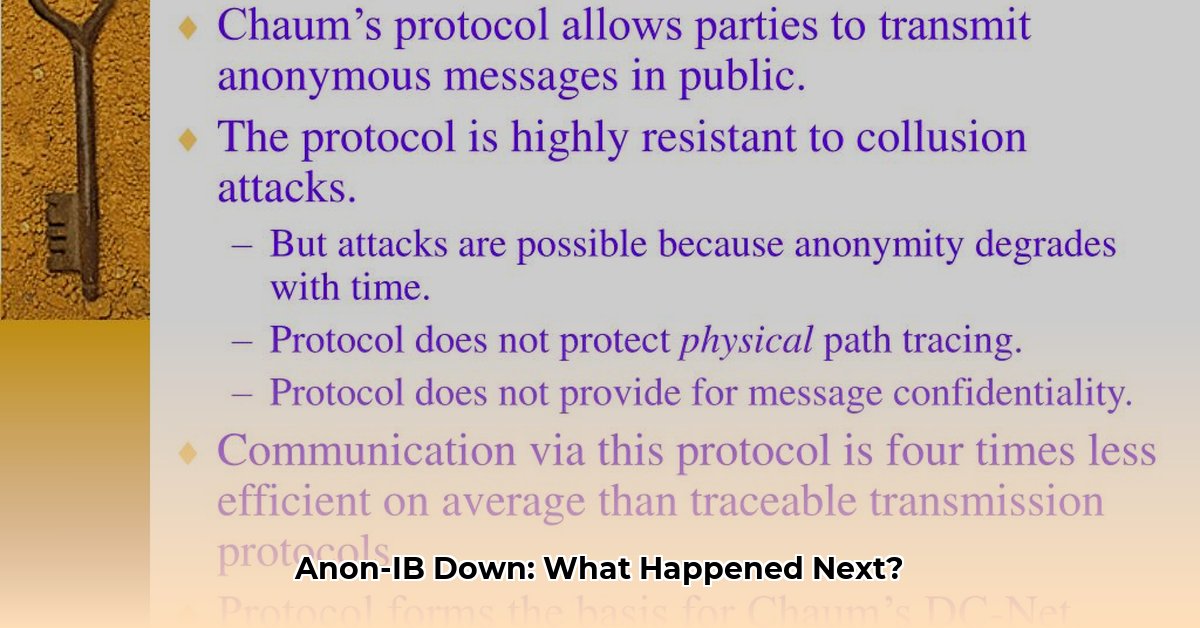Inside Anon-IB: A Digital Hall of Shame
Anon-IB was a notorious online platform dedicated to the sharing of non-consensual pornography, commonly known as revenge porn. Operating much like a digital bulletin board, the site allowed users to anonymously upload and share explicit images and videos of others without their consent. This anonymity fostered a toxic environment where intimate images were weaponized, turning into tools of harassment and humiliation. The site’s structure, mirroring other infamous imageboards like 4chan and 8chan, consisted of various boards categorized by cryptic tags like “/t/”, “/can/”, and “/ken/.” Each board likely catered to specific, often disturbing interests, creating echo chambers where harmful content thrived.
Deconstructing the Platform’s Architecture
Anon-IB’s architecture, similar to that of 4chan and 8chan, was likely designed to facilitate anonymous posting and sharing. While the exact technical specifications remain unclear, it probably used a combination of server infrastructure and software to host the content and manage user accounts. This architecture made tracking users and identifying perpetrators more challenging for law enforcement. The site’s organization into different boards, each with its own community and set of rules, suggests an attempt to categorize the content, though this probably did little to mitigate the harm caused.
| Board Tag | Probable Focus | Concerns |
|---|---|---|
| /t/ | General Discussion | Unregulated content |
| /can/ | Photos/Videos of Canadians | Privacy violations, Doxing |
| /ken/ | Specific, unclear focus | Mirrored content from other boards |
Unmasking the Perpetrators: The Anon-IB Investigation
The investigation into Anon-IB was a complex undertaking, hampered by the site’s emphasis on anonymity. Law enforcement agencies had to employ sophisticated digital forensic techniques and international collaboration to identify the individuals behind the platform. The investigation likely involved tracing IP addresses, analyzing server data, and potentially infiltrating online communities to gather evidence. The breakthrough came in March 2017 when a woman in the Netherlands filed a complaint, triggering a year-long investigation that eventually led to the seizure of Anon-IB’s servers and the arrest of five individuals. This success highlights the importance of international cooperation and the crucial role of individual reports in initiating and supporting these complex investigations.
The Challenges of Policing Anonymity
Investigating platforms like Anon-IB presents unique challenges for law enforcement. The anonymity offered by such sites makes it difficult to trace users and gather evidence. Investigators must often employ advanced techniques like network analysis and digital forensics to identify perpetrators. The decentralized nature of the internet and the use of encryption further complicate these investigations, requiring significant resources and expertise. Furthermore, the international scope of these platforms necessitates collaboration between law enforcement agencies across different jurisdictions, which can be a lengthy and complex process.
The Human Cost: Victims of Anon-IB
The victims of Anon-IB were diverse, spanning different ages, genders, and backgrounds. The common thread uniting them was the devastating experience of having their intimate images shared online without their consent. The psychological and emotional impact of this violation is profound. Victims often experience feelings of shame, humiliation, anxiety, depression, and even PTSD. The online nature of the abuse means the images can spread rapidly and remain accessible indefinitely, compounding the trauma. Support networks are essential resources for victims, and the investigation itself demonstrates that legal recourse, while complex, is possible.
Providing Support and Resources
The trauma inflicted by Anon-IB on its victims underscores the critical need for support services. Organizations dedicated to helping victims of revenge porn offer a range of services, including:
- Legal assistance: Helping victims navigate the complex legal landscape and pursue justice.
- Counseling and therapy: Providing emotional support and guidance to cope with the trauma.
- Advocacy: Raising awareness about revenge porn and advocating for stronger legislation.
If you or someone you know has been affected by revenge porn, resources are available. Reach out to local law enforcement or organizations specializing in online abuse.
The Legal Battlefield: Free Speech vs. Protection
Anon-IB ignited a critical debate about the balance between online free speech and the protection of individual privacy. The anonymity afforded by platforms like Anon-IB raises complex legal and ethical questions about the responsibility of website operators for the content hosted on their platforms. While some argue that anonymity is essential for online freedom of expression, others contend that it creates a haven for harmful activities like revenge porn. This ongoing discussion underscores the need for clear legal frameworks that address the unique challenges posed by online platforms while respecting fundamental rights.
The Ongoing Fight Against Revenge Porn
The shutdown of Anon-IB was a significant victory, but it represents just one battle in a larger war. The fight against revenge porn is far from over. New platforms can easily emerge, and the tactics used to exploit individuals may evolve. A comprehensive approach is needed to combat this pervasive issue, one that combines stronger legislation, improved enforcement, technological solutions, and increased public awareness. Education and awareness campaigns are crucial for changing societal attitudes toward online privacy and consent. Holding perpetrators accountable and strengthening legal frameworks are essential for deterring future offenses. Continued research into the motivations behind revenge porn and the effectiveness of various interventions is equally important.
Beyond Anon-IB: Lessons Learned and Future Challenges
The Anon-IB case provides several important lessons. It highlights the potential for online platforms to be misused for harmful purposes, the devastating consequences of online abuse, and the challenges faced by law enforcement in investigating crimes that transcend national borders. The case also emphasizes the need for ongoing efforts to enhance online safety, promote digital literacy, and provide support for victims of online abuse. The ongoing development of technology and the evolving nature of online communities require continuous adaptation and innovation in both legal frameworks and law enforcement strategies.
A Call to Action
The fight against revenge porn and online abuse requires a collective effort. Here are some ways you can contribute:
- Educate yourself and others: Learn about the risks of online sharing and the importance of consent.
- Practice safe online habits: Use strong passwords, be cautious about sharing personal information, and think twice before posting anything online.
- Support victims: If someone you know has been affected by revenge porn, offer them support and encourage them to seek help.
- Advocate for change: Support organizations working to combat online abuse and advocate for stronger legislation.
By working together, we can create a safer and more respectful online environment for everyone.
- 3 Interesting Facts About Hydroelectric Energy You Should Know - January 18, 2026
- 10 Facts About Hydropowers Global Impact and Future Potential - January 17, 2026
- Interesting Facts About Hydroelectric Energy and Its Global Impact - January 16, 2026















